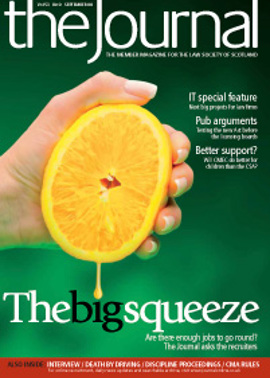Sending a unified message

The Glasgow Bar Association has been closely following the reform of summary criminal procedure and criminal legal assistance for about a year now; the livelihood of many of our members is solely dependent upon it.
It is no secret that we did not agree with the approach adopted by the Law Society of Scotland in April 2008, when the proposals for a new summary criminal legal aid payment regime were finalised. The Society “cautiously welcomed” the proposals and simply wished them kept under review. Our members were very much against the proposals and voted unanimously in favour of taking a stance against them at that time. We knew that the proposals would mean cuts in fees already frozen for nine or 16 years.
GBA members recognised that there might be benefit in being a part of the review group, but also had misgivings. We resolved to consult fully with our members. The debate at the meeting, as with many before in relation to the reforms, was educated, articulate and thoughtful. The types of issue raised were the fact that involvement in the review implied acceptance of the Government’s 6% cut in the summary criminal legal aid budget; the dismal history of the supposed review process in relation to civil legal aid; the legitimacy of the review group’s constitution and mandate; the lack of assurances given in relation to the review process; and the lack of parameters or remit for the review. In relation to the last point, I had sought clarification from the Cabinet Secretary, on two occasions. His reply declined to give any assurances or even commit a remit for the review to writing.
Ultimately the GBA membership voted not to seek to be part of the review group at that time. The review group began to meet with the Government. Having been informed of our intention to write to every criminal solicitor in Scotland, the Society finally began to publish information on its website and wrote individually to each criminal legal aid solicitor.
However, the GBA committee members continued to be approached by members and non-members alike, concerned about the impact of summary criminal legal aid reform. The GBA duly wrote to all criminal legal aid solicitors asking various questions, including whether a meeting of the Society should be convened to consider the many areas of concern. An overwhelmingly positive response was received and so the GBA proceeded to requisition the meeting.
The GBA’s intention in requisitioning the SGM was to canvass the views of the profession, at a single forum, in relation to these important areas. Against that background, the GBA was surprised to hear from more than one Law Society of Scotland office bearer during debate at the SGM that they had thought the meeting was likely to be a “waste of time”. Despite the anti-GBA rant by one review group member, and the incredible admission from the Vice President that he had considered “rigging” the vote, the GBA thought the meeting served a most useful purpose. To air the views of the profession was exactly why the meeting was requisitioned. The three motions, which were passed unopposed, will send a unified message from the profession that the cut in the summary criminal legal aid budget is unacceptable and will provide a mandate to the members of the review group to press for change, which will be to the benefit of us all. The motion condemning increased bureaucracy will allow the Society’s representatives to attack the changes made in the application procedures and in other areas by the Scottish Legal Aid Board.
The motion expressing support for the members of the review group (rather than for the review process itself) was a Society motion. The GBA understands that the review group has asked the Cabinet Secretary to commit the remit of the review to writing and to provide written assurances, in terms that he has thus far failed to provide to the GBA. In the event that such a written remit or assurances are forthcoming, the GBA would immediately revert to all members seeking clarification as to whether they wished to have a representative on the review group. With nothing definite from the Cabinet Secretary, however, it is difficult to see what has changed since our vote was taken earlier in the summer.
In my view the most positive aspect to come from the meeting was a near unanimous agreement that the profession must work together, towards the common good. It is thus to be hoped that the Society will seek to ensure that it is truly representative of its members and work to promote the aims of the majority.
In this issue
- Discrimination is discrimination
- Servitudes and shop fronts
- DLA Piper in expansion mode
- At your service
- ARTL and secure signatures
- Sending a unified message
- Facing the squeeze
- Room for doubt
- Dealing with our older casework
- Regime change
- Risky business
- Drink problems
- Consumer credit licence changes
- RFPG's online trainee service
- Adult incapacity: new caution scheme agreed
- Appreciation: Sandy McIlwain
- Stair Memorial marks its 21st
- "Gateway" opens its doors
- Facing the lean years
- On the road again
- E-legal @ Nothing but the Net
- IT - ever onwards
- Testing competency
- A Wise decision
- Name calling
- Diverse guidance
- Tackling the sporting bodies
- Keeping it legal
- Scottish Solicitors' Discipline Tribunal
- Website reviews
- Book reviews
- Charging the death offences
- Another hoop to jump
- An idea whose time has gone
- Society launches home report solution






